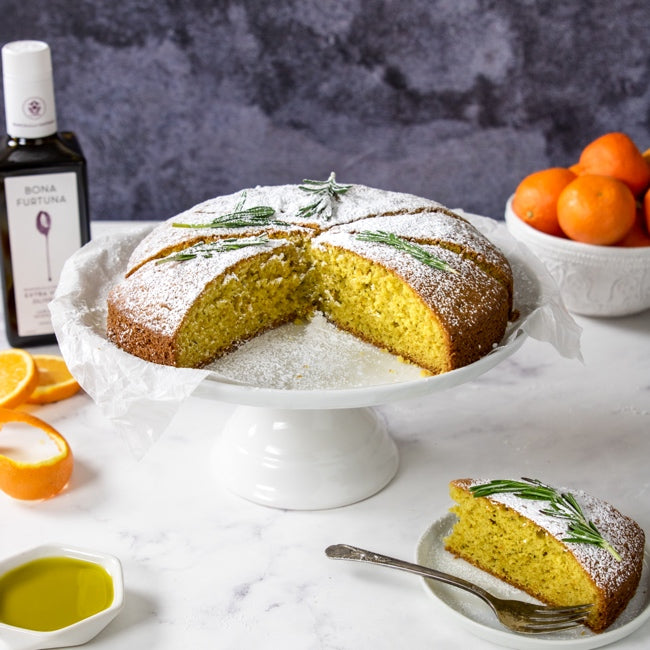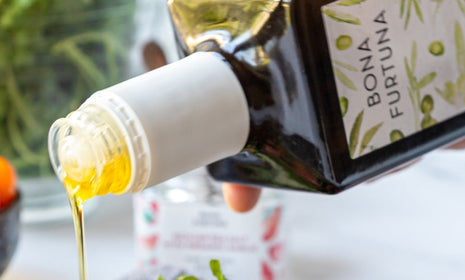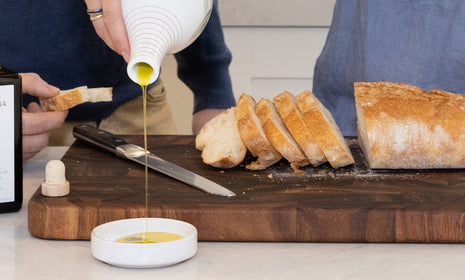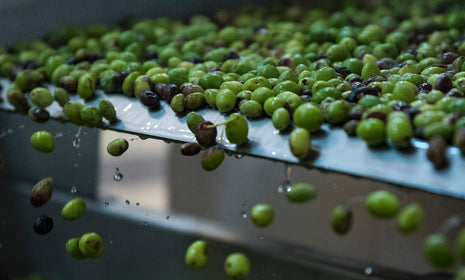Cooking oils have received a lot of attention lately. Used at restaurants, fast casual establishments, in mass-produced products, and at home, we encounter oils everywhere we eat. As it turns out, a lot of these oils, when consumed on a regular basis, can have long-lasting negative effects on our health. The good news is that there are plenty of healthy oil options, especially when it comes to cooking at home. A staple in the Mediterranean diet, one of the oldest, and healthiest cooking oils available is olive oil. Rich in polyphenols, antioxidants and antacids, olive oil not only offers great nutritional benefits, but it also tastes amazing while doing so.
Our founding product, olive oil holds a special place in our hearts. We’re here to break down some questions we receive on a daily basis.

IS IT SAFE TO COOK WITH OLIVE OIL?
The "Is it safe to cook with olive oil?" question is a familiar one to all of us. One of the main concerns people have about cooking with olive oil is its smoke point. High quality extra virgin olive oil which has not been processed or refined has a higher smoke point of roughly 410°F. Research has shown that when any oil reaches its smoke point, it begins to degrade in quality. Used for baking, sautéing, grilling, and pan frying, extra virgin olive oil is not only safe to cook with, but it is also a heart healthy and flavorful choice.
OLIVE OIL VS VEGETABLE OIL
One of the most common kitchen debates is choosing olive oil vs vegetable oil. While vegetable oil is often used for its neutral flavor and high smoke point, it’s usually a blend of highly refined oils that are heat extracted, high polyunsaturated fatty acids, and trans fats. As a result, vegetable oil can promote inflammation, increase plaque buildup, can negatively affect your gut biome, and can contribute to other health issues. Olive oil, on the other hand, is rich in antioxidants and heart-healthy monounsaturated fats, making it a far healthier alternative. Organic extra virgin olive oil has the added benefit of being produced without any harmful chemicals or additives.
CAN YOU REPLACE VEGETABLE OIL WITH OLIVE OIL?
Definitely! In most recipes, you can replace vegetable oil with olive oil at a 1:1 ratio. Whether you’re sautéing vegetables, grilling meats, or even baking, olive oil offers more depth of flavor and better nutrition. We recommend using an everyday olive oil that is designed to be balanced for a multitude of uses.
IS OLIVE OIL A GOOD CANOLA OIL SUBSTITUTE?
Looking for a canola oil substitute? Olive oil is one of the best options. It’s a clean, natural canola oil replacement that offers a similar fat content while being far superior in terms of flavor and health benefits. Highly processed and refined with heat and chemical extraction, canola oil is rich in omega-6 fats which can raise your risk of Alzheimer's, obesity and heart disease when consumed in excess. Cold extracted extra virgin olive oil on the other hand retains its natural polyphenols, which help fight inflammation and oxidative stress. With high levels of HDL cholesterol, which helps to flush LDL cholesterol from your body and prevents it from building up in your arteries, olive oil can actually help to maintain healthy cholesterol and glucose levels.

OIL FOR FRYING: IS OLIVE OIL SAFE?
When choosing an oil for frying, many people default to neutral, highly refined oils. Olive oil has a smoke point of around 400°F, which makes it suitable for pan-frying, shallow frying, and even deep-frying. If you choose to deep fry with olive oil, be sure to closely monitor the temperature of the oil to ensure it doesn’t get above 400°F. Boasting a fresh, peppery flavor profile, olive oil is not only a healthier option than vegetable oil or canola oil, but it’s also more flavorful.
GRAPESEED OIL VS OLIVE OIL
Both grapeseed oil and olive oil are often touted as healthy. But in the comparison of grapeseed oil vs olive oil, extra virgin olive oil gains a nutritional edge. Like other seed oils, grapeseed oil contains more omega-6 fatty acids, which can contribute to inflammation when consumed in excess. Olive oil is higher in monounsaturated fats and antioxidants, making it the better long-term choice for overall health.

OIL SUBSTITUTION FOR BAKING: OLIVE OIL IN CAKE?
Yes, you can even use olive oil in cake recipes! It’s a wonderful oil substitution for baking that imparts a rich, moist texture and a glimmer of peppery fruitiness. While we’re always here for a gorgeous olive oil cake, you can also use extra virgin olive oil for lemon or chocolate cake recipes to add a Mediterranean twist that’s both indulgent and nourishing.
OUR CONCLUSION
Is it safe to cook with olive oil? Definitely. In fact, it’s more than safe; it's one of the healthiest additions you can bring to the kitchen. Whether you’re seeking a canola oil substitute, comparing vegetable oil vs olive oil, or are experimenting with olive oil in baking, olive oil transforms your cooking with flavor, elegance and versatility. Best of all, it adds many health benefits into your daily eating habits.
Live and cook Italian — with love, joy, and plenty of extra virgin olive oil.





Be the first to comment